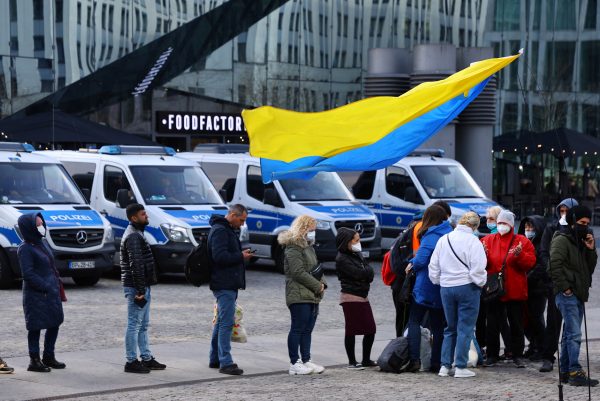Margo Baldauf told a BBC reporter that she recalled the travails of her 97-year-old mother fleeing Hitler’s Nazis: ‘I am more or less a child of a refugee. So I feel obliged to do something for refugees. It’s not Hitler this time, but for me it somehow feels like what Putin does is what Hitler did before’. Additionally, there was the faith based dimension propelling humanitarian relief. Maria Blahoslovennio and Maria Vseblaha, two nuns from the western Ukrainian city of Ivano-Frankivsk, took upon themselves the mission of rescuing their students from a Greek Catholic school to safety in the EU. As Sister Blahoslovennio put it, ‘when we heard about the war, we prayed with our sisters for peace and it gave us comfort… faith has an important role during times like this and there are priests across Ukraine to help people if they need it’. Their group was rapidly given succour by a German charity whose driver embarked on a 12-hour journey to take them back to Munich. In many ways, this evoked the ordinary heroism of prisoner rescues 80 years ago when Europe was in the throes of a world war.
Local activism is not new, and was seen in the wake of the Indian Ocean tsunami of December 2004 and Typhoon Haiyan in 2013. While these disaster triggered a trend of grassroots initiatives, mitigating calamities in less accessible locations still has to rely on an organisational and logistical conveyor belt of UN agencies and NGOs.
In the unfolding drama, citizens are moved to act through the facilities of everyday convenience. Aid is donated straight from apartment refrigerators, store rooms and garages, purchased from supermarkets and transported by personal cars to the borders. In some cases, spare rooms have been offered in place of the usual emergency shelters.
The scenes greeting Ukrainians arriving in Berlin evoke the atmosphere of a sincere embrace of a universal cosmopolitanism. Germans offering accommodation with few strings attached seem more akin to hospitality for tourists. But this is the visual symbolism of the new citizen humanitarianism. There is evidence of both spontaneity and coordination. Among the welcoming parties are medical teams, translators, volunteers and organisers. Even SIM cards are being provided free for those who wish to have a phone operating upon arrival.
But along with this wave of people leaving Ukraine and humanitarian efforts at local level, the world has also witnessed a hidden ugliness. Despite the well-meaning humanitarian efforts of many, the treatment of foreigners, especially students and residents of African and Asian descent, seems to be a blemish on all the good that has come about in the wake of the war. Foreigners escaping Ukraine have faced ‘unequal treatment and delays’.
Ukraine is a destination for students and immigrants from around the world. The largest groups of international students are from India, Morocco, Azerbaijan, Turkmenistan and Nigeria. These students now find themselves desperately trying to get out of a war zone but have been delayed in their efforts by authorities prioritising Ukrainians.
Other European nations seem to be following suit with xenophobic environments. Denmark was the first liberal democracy to tell Syrian refugees to return to their war-torn home in 2019 while Russian jets were still dropping missiles. Denmark has now welcomed Ukrainian refugees, attacked by the same perpetrator, with open arms. This disparity suggests that some lives are valued above others. This xenophobia has no place if true humanitarianism is to emerge from the ground up.
As with these events in Europe, lessons can be learnt for the rest of the world and for both humanitarians and the general public. The fear of interference and clinging on to borders stands in the way of help coming from masses who may once have been in similar positions.
An example of this are the Achehnese fishermen who intervened to rescue Rohingya refugees while the Indonesian government was busy deciding on what types of legal action might be taken, as people remained stranded at sea. There is a stark difference in resources and levels of coordination being available to those in Europe and some communities in Asia and the Pacific. But humanitarianism transcends geography, socioeconomic class, language and other barriers. Racism and xenophobic thinking should have no place.
Humanitarianism cannot be rooted in geographic divisions. The Asia Pacific experiences more natural hazards than any other part of the world. But formal agencies do not see local communities as possible humanitarian actors who can deliver immediate response and aid. Foreign humanitarian actors should come in with a healthy dose of humility, ready to learn from local communities. If and when they do discuss empowering local communities, it should be based on what the communities need, not what they think communities need.
It is time to consider the deep and sustained involvement of local community members as humanitarian actors in their own right in the Asia Pacific. To do this, there needs to be acceptance that people with less resources are capable of contributing. There should be greater recognition of the role local communities play on their own. Global governance should be composed significantly from the citizen’s narrative.
Alan Chong is Associate Professor at the S Rajaratnam School of International Studies, Nanyang Technological University, Singapore.
Tamara Nair is Research Fellow in the Centre for Non-Traditional Security Studies at the S Rajaratnam School of International Studies, Nanyang Technological University, Singapore.

